Parliament Speaker Says Ex-Supporters Now Blame Iran's Revolution For Ills
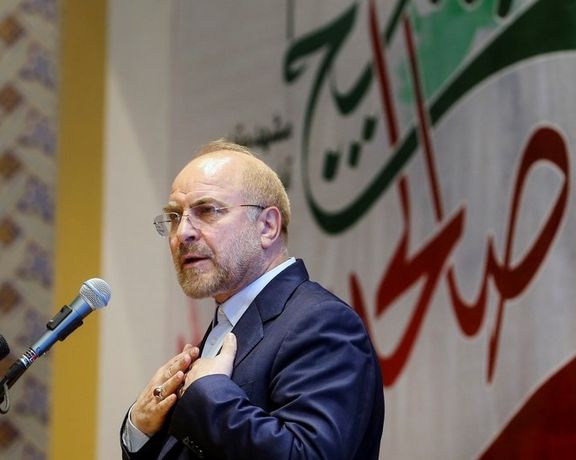
Iran’s parliament speaker says the people who regret the 1979 revolution attribute all the failures in the country to the Islamic Republic.

Iran’s parliament speaker says the people who regret the 1979 revolution attribute all the failures in the country to the Islamic Republic.
Mohammad Bagher Ghalibaf made the remarks during a joint meeting with officials from the Revolutionary Guards, the Intelligence Ministry, and the country’s police Monday night.
He said there are some people who had been supporters of the Islamic Revolution; “who spoke and wrote for the revolution” but now regret their decisions and say the revolution has had no success and “attribute all of our failures to the revolution.”
He stressed the necessity for more cooperation among the intelligence community in the country, saying that “monitoring is one of the serious needs of the country in the current situation”.
Ghalibaf added that the parliament has allocated a day of its open sessions to monitoring measures and called for more effective use of monitoring tools.
Politicians on both ends of Iran's political spectrum continue to express concernover the dire state of country’s economy and the risk of a social explosion.
Increasing criticism by regime insiders coincides with the anniversary of the Islamic revolution; a time when officials glorify the 1979 revolution and its "achievements”.
This year's celebrations for the revolution are marrednot just by the pandemic but also the fact that it is much harder than ever to speak of the promises of freedom and prosperity given to masses in 1979.

The new Palestinian envoy to Iran has met President Ebrahim Raisi and expressed concern over the growing relations between regional countries and Israel.
Salam Zawai presented her credentials to Raisi on Tuesday, replacing her father Salah Zawawi who was the Palestinian authority’s ambassador to Tehran for over 40 years.
Her appointment by President Mahmoud Abbas drew criticism and accusations of corruption and nepotism from some Palestinians. When Zawawi's father became ambassador, Yasser Arafat was the head of the Palestine Liberation Organization.
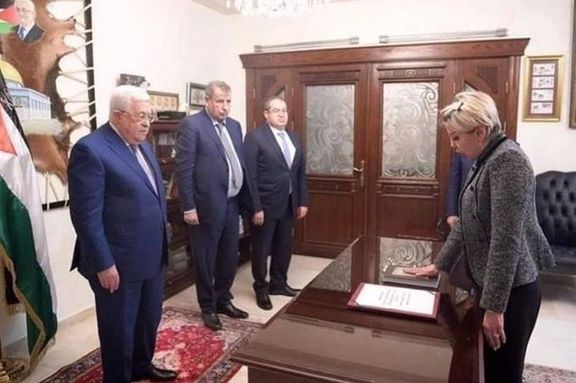
During the meeting, she congratulated the Iranian president on the anniversary of Iran’s revolution, describing it as a victory for the Arab and Muslim world, and slammed regional countries for their normalization of ties with Israel.
Iran, as Israel’s archenemy, has sharply criticized the United Arab Emirates and Bahrain for the US-brokered Abraham Accords normalizing relations with Israel in 2020. Common fear of Iran was a factor behind the move.
Zawawi expressed hope for the formation of an independent Palestinian state with Jerusalem as the capital, where she said Supreme Leader Ali Khamenei can lead prayers.
Last week, Israeli Defense Minister Benny Gantz paid a visit to Bahrain amid heightened tensions in the Persian Gulf after missile attacks on the United Arab Emirates by Yemen's Iran-backed Houthi movement.
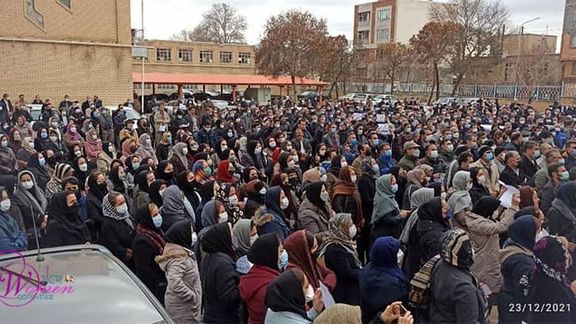
Politicians on both ends of Iran's political spectrum continue to express concern over the dire state of country’s economy and the risk of a social explosion.
Increasing criticism of regime insiders coincides with the anniversary of the Islamic revolution; a time when officials glorify the 1979 revolution and its "achievements," as Supreme Leader Khamenei did in a speech on Tuesday.
Seyyed Reza Akrami, a cleric who has been a member of the Iranian parliament for 20 years told the semi-official news agency ISNA that "prices have broken loose and nobody in the government is accountable" for the ongoing economic crisis.
Akrami criticized the government for its dependency on oil revenues while also lashing out at politicians who do nothing other than trying "to claim their own share of the country's budget."
He opined that the coronavirus pandemic, US sanctions and the situation in the region have contributed to the country's worst economic crisis. The impact of sanctions and the pandemic are known to everyone, but by "regional situation" Akrami probably meant the money Iran is spending on its regional ambitions in proxy wars in Iraq, Syria and Yemen.
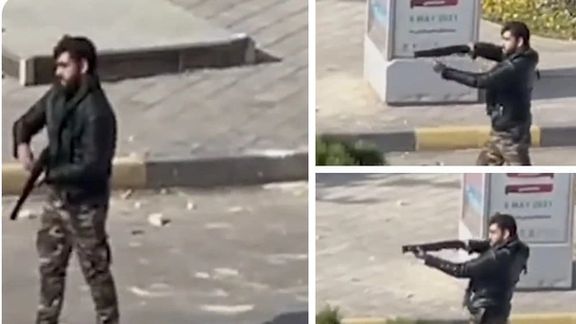
Akrami called on the government to behave realistically and pragmatically amid the economic crisis and to move away from "ideals and ideologies" and accept the realities on the ground. He advised lawmakers not to engage in wishful thinking, stop chanting slogans and see the realities.
Akrami also called for the merger of high maintenance religious organizations such as the Islamic Propagation Organization, the Propaganda Office of the Seminary and the Arts Center of the Islamic Propagation Organization as they all do the same thing and duplicate each other's efforts.
Warning of a social explosion
Meanwhile, Massoud Pezeshkina, a left-of-center lawmaker from Tabriz said the people's financial status and purchasing power are declining on a daily basis, and the Iranian society is on the verge of an explosion.
Pezeshkian said: "More than 40 years after the Islamic revolution we still have problems in supplying drinking water, building roads, taking care of the villagers, and creating jobs. This means that we have made mistakes along this long road." He attributed part of the problem to not having a roadmap.
Pezeshkian’s remarks comes while the Islamic Republic boasts about its five-year development plans and Supreme Leader Khamenei's vision for the next 40 years.
Meanwhile, the lawmaker said that Iran cannot fight all other countries. He criticized the opponents of a nuclear agreement, and said, "You cannot improve the people's livelihood by tearing up the nuclear deal."
During the past week, many observers and politicians have warned officials about the critical situation of the economy. Economist Hashem Pesaran argued that the population is likely to turn into a bipolar society in which the affluent class and the underprivileged people will have to face each other in a fierce confrontation.
"A conflict will certainly take place and that is very dangerous. The former will be blinded by pride and the latter by grudge. The angry poor people will be looking for an opportunity to attack and take revenge. In a tsunami, everyone will sink no matter how big their ship is," Pesaran warned.
Meanwhile, sociologist Taghi Azad Armaki recently warned that as the economic crises worsens, the underprivileged class prepares itself for the final confrontation with the political-economic elite.
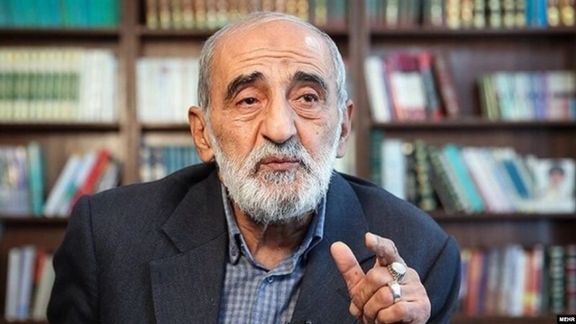
An editorial in Kayhan claimed views expressed by its hardliner editor Hossein Shariatmadari were shared by Supreme Leader Ali Khamenei and a unified ‘regime.’
Headlined "Let's Not Deceive Ourselves, Kayhan's Stance Is Leader's Stance," the missive on Tuesday responded to criticism from reformist journalist Ahmad Zeydabadi, who in a Telegram post Thursday wrote that Shariatmadari was behaving as if he is “top authority in the country” by lambasting reformist clerics who had issued a statement finding an “unmistakable crisis” in Iran.
The Kayhan editorial charged that if Zeydabadi were right, then “someone else should be appointed to take the helm of Kayhan… [as] stances put forth by the chief editor of Kayhan have nothing to do with the wish, will, and policies of the system.”
While veteran editor Shariatmadari is Khamenei’s representative at the newspaper, Khamenei has many times declined to follow Shariatmadari’s advice, including over backing talks with Europe two decades ago, with the Americans over Afghanistan and Iraq, and in Iran’s agreeing to limit the nuclear program in signing the 2015 JCPOA (Joint Comprehensive Plan of Action).
But Kayhan’s latest editorial asserted that as a "radical revolutionary," the paper’s chief editor was the first to announce stances the “regime” would subsequently adopt.
Kayhan argued that supporters of a nuclear deal claimed that Supreme Leader's support for the negotiation team led by former Foreign Minister Mohammad-Javad Zarif during the talks was proof of irrelevance of Shariatmadari's criticism, but Zarif's ill fate clearly showed that Shariatmadari's critical stance was the same as the Supreme Leader's stance.
"The one who fell to the ground in the confrontation between Kayhan and Zarif was Zarif, and the one who was honored was Hossein Shariatmadari," the editorial continued. It also reminded readers that Khamenei had last year described as a “big error” Zarif’s criticism of the role in foreign policy of Qasem Soleimani, the Iranian general and Quds Force commander killed by a US drone strike in Baghdad in 2020.
The newspaper was referring to Khamenei's harsh words against Zarif in May 2021 after a leaked audio recording of an interview with him made headlines. In the interview Zarif had strongly criticized the Revolutionary Guards (IRGC) and the former commander of its Qods force, Ghasem Soleimani for hijacking Iran's foreign policy. Without mentioning Zarif's name, Khamenei called the remarks "a big error," that was "regrettable and surprising."
"This was a big mistake that should not have been committed by an Islamic Republic official. The enemies are annoyed by the Qods Force's influence in the region," and one part of the political system should not undermine the other part, Khamenei said.
The editorial went on to suggest it had been Shariatmadari's criticism that had led recently to Ali Shamkhani, secretary of the Supreme National Security Council, retracting a suggestion of the possibility of direct bilateral talks with Washington over the nuclear issue.

Iran’s Supreme Leader Ali Khamenei has received his booster shot and urged people to do the same as the omicron variant of Covid-19 has gripped the country.
During a meeting with air force commanders on Tuesday, Khamenei said that he believes in and acts upon the recommendations of doctors and received his third dose of the vaccine a few months ago.
According to Alireza Marandi, Khamenei's personal physician, the supreme leader received the Iranian-manufactured Covid-19 vaccine called Cov-Iran Barakat, but some say political leaders have been inoculated by the AstraZeneca vaccine.
Khamenei had banned the purchase of US and British-made vaccines in January 2021, saying that "Importing vaccines made in the US or the UK is prohibited. They are completely untrustworthy. It is not unlikely that they would want to contaminate other nations… French vaccines are not trustworthy either”.
The number of daily Covid deaths is now over a hundred while daily cases are reported to be about 40,000.
Health authorities, who have said the country is in its sixth wave of the pandemic, warn the figures are expected to increase exponentially during the next two months, stressing that the new variant is also very difficult to detect.
Despite the highly contagious Covid-19 Omicron variant spreading fast across Iran, President Ebrahim Raisi has rejected proposals for a nationwide shutdown.
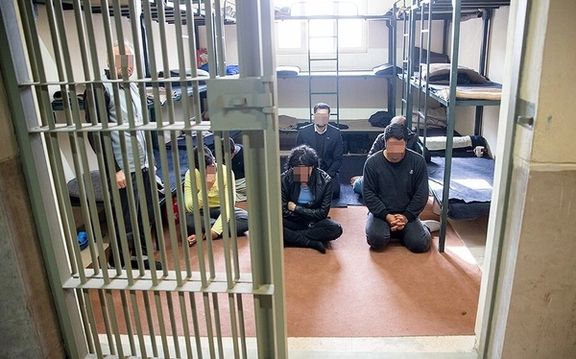
Hundreds of rights activists have asked five political prisoners held by the Islamic Republic to end their month-long hunger strike.
In a letter 650 activists said the hunger strike has raised awareness about the conditions of the Iranian prisoners of conscience and garnered support by many human rights organizations from inside and outside of Iran.
The letter urged the prisoners to end their strikes as reports indicate their health is deteriorating.
Shakila Monfared is being held in Qarchak Prison, also known as Rey Women Prison, while Hamid Haj-Jafar Kashani, Sina Beheshti, Mohammad Abolhasani, and Saeed Tamjidi are in Great Tehran Penitentiary, aka Fashafuyeh.
They started their hunger strike four weeks ago to protest neglect by prison authorities and the death of poet and political prisoner Baktash Abtin, who succumbed to Covid-19 complications after he was denied timely treatment by officials at Tehran’s notorious Evin prison.
Tamjidi, one of the prisoners who was arrested during the November 2019 nationwide protests, along with his fellow hunger-striking prisoners, was beaten by guards and medical staff when they were feeling sick and taken to the prison infirmary in late January.
Earlier in January, a young political prisoner, Adel Kianpour, who was on hunger strike to demand a fair trial died in detention without receiving any medical care in the Sheiban prison in the southwestern city of Ahvaz in Khuzestan province.